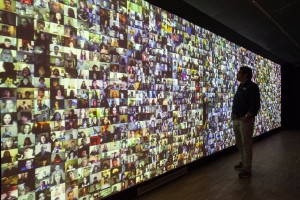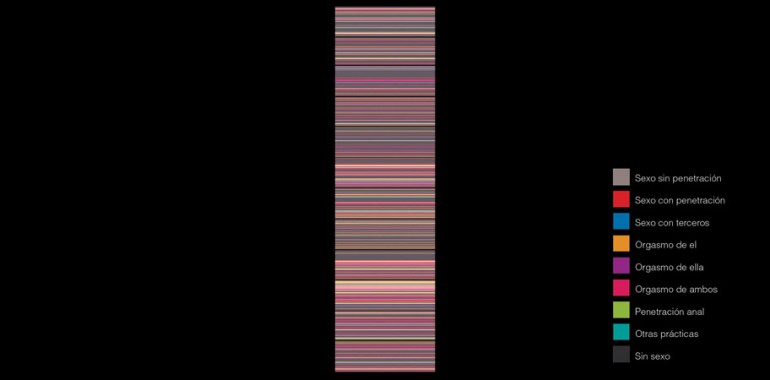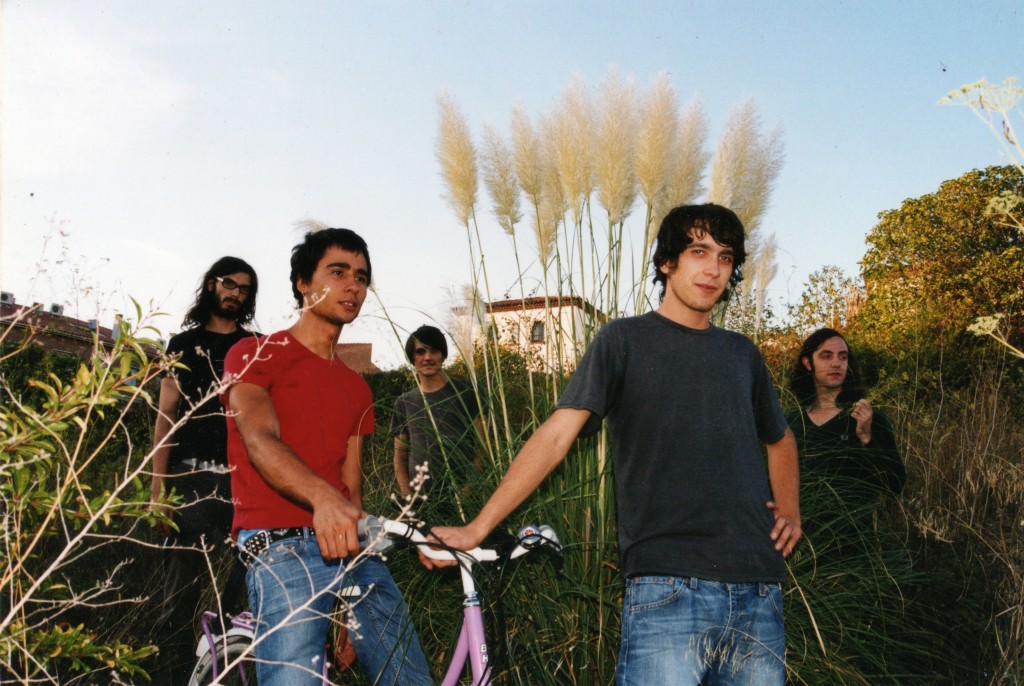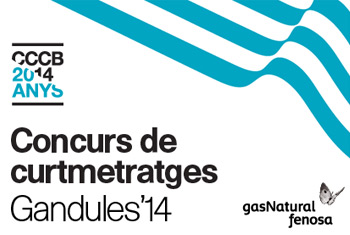 When August comes around, the people of Barcelona know they have a date with the CCCB. During 11 editions over as many years, Gandules has offered a very varied programme of films al fresco. This year, to coincide with 20 years of the CCCB, Gandules has been opened up to the public in an international competition whose theme is “Away from Home” – in other words, emigration.
When August comes around, the people of Barcelona know they have a date with the CCCB. During 11 editions over as many years, Gandules has offered a very varied programme of films al fresco. This year, to coincide with 20 years of the CCCB, Gandules has been opened up to the public in an international competition whose theme is “Away from Home” – in other words, emigration.
Over 50 short films have been entered for the competition from different countries, especially from Spain (Catalonia, Madrid, Basque Country, Andalusia, Valencian Community and Galicia), but also from Mexico, Argentina, Brazil, Sweden, Germany, France, Italy, Switzerland and the Netherlands.
Of all of these films, the following twenty have been selected:
- 9 dies, Imma Gandia and David Castro (Tarragona, Spain), 2014, 13 min 4 sec
- Adeus, Antón Varela and Maria José Pérez (A Coruña, Spain), 2012, 4 min 25 sec
- Aller et retour, Núria Monjo Pastor (Valencia, Spain), 2012, 2 min 13 sec
- Asghar, diario ambulante, Violeta Blasco Caño (Barcelona, Spain), 2013, 15 min
- Becas Azkuna, Araceli Sánchez Perna (Bilbao, Spain), 2013, 2 min 17 sec
- El Guatón, Kiko Santos (Sao Paulo, Brazil), 2012, 4 min
- El viatge, Helena Bonastre (Barcelona, Spain), 2014, 14 min 3 sec
- Encajados, Alberto Bougleux (Barcelona, Spain/Italy), 2013, 15 min
- Gabriel, Alice Cugusi (Italy/France), 2011, 9 min 58 sec
- Imágenes secretas, Diana Toucedo Crespo (Barcelona, Spain), 2013, 15 min
- Las tardes, Alba Molas Closas (Barcelona, Spain), 2014, 10 min
- Lugares comunes, Delia Márquez Sánchez and Pablo Díaz Morilla (Malaga, Spain), 2014, 3 min 21 sec
- Míjau, Olaia Sendón (A Coruña, Spain), 2014, 7 min 56 sec
- Primers dies, Incoming new students at the Institut Milà i Fontanals (Barcelona, Spain; Pakistani, Bengali and Filipino pupils), 2013, 12 min 06 sec
- Spaniards in London, Javier Moreno Caballero (Spain/United Kingdom), 2013, 9 min 15 sec
- Toledo, Ohio, Maria Solé and Melissa Suárez del Real (Spain/Mexico/France), 2014, 4 min 21 sec
- Tu i Berlin, Anna Mitjà Comas (Girona, Spain), 2013, 14 min
- Udlandet, Aina Pociello Mas (Barcelona, Spain), 2014, 3 min 33 sec
- Viceversa, Atzin Ortiz González (Mexico/Argentina), 2013, 6 min
- Voluntario, Javier Marco (Madrid, Spain), 2014, 3 min 52 sec
These short films are highly varied in terms of genre: documentary, fiction, animation, experimental and even video art. The majority portray dramatic situations and injustices, but there are also some that treat the topic with humour. Two main themes can be singled out: stories about African or Latin American immigrants in our country, and stories about people from our country who have had to leave, forced by the crisis. As an anecdote, it is interesting to highlight the large number of short films explaining this experience from Berlin, as well as the fact that the majority are works produced by women.
From now on, it will be the audience’s job to vote for their favourites, which can be seen shortly on the website of the CCCB, up until xx July. The nine shorts that obtain the most votes will be screened before each Gandules film and, in addition, will obtain a three-month subscription to Filmin. The winning short film, to be decided by a jury of professionals linked to the audiovisual and cultural world, will win the Gas Natural Fenosa Prize which has a value of 500 euros. In addition, the 20 selected films will also each receive a Friends of the CCCB card.
Vote for the nine shorts that we will be screening at each session of Gandules’14 Gas Natural Fenosa on this link. You can vote up until 6 July at midnight.
Al Fresco Programme
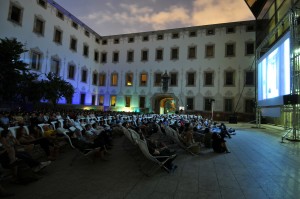 Gandules Gas Natural Fenosa is an audiovisual season that runs during each month of August in the Pati de les Dones of the CCCB. Since 2003, the programme has been linked to the CCCB’s activities and has been scheduled by different programmers, who each year have proposed a selection of eclectic films. For example, the 2003 series was devoted to trash culture, coinciding with an exhibition on the same theme; that of 2005 was devoted to humour; in 2006 the series was related with NOW. Meetings in the Present Continuous; 2008 explored interculturality, while for 2009 films were screened about music in film, and in 2012, experts from the world of cinema, such as Àngel Quintana, Núria Vidal, Carlos Losilla and Jordi Costa chose some of the best films that were acclaimed by critics but had little success with the commercial circuits.
Gandules Gas Natural Fenosa is an audiovisual season that runs during each month of August in the Pati de les Dones of the CCCB. Since 2003, the programme has been linked to the CCCB’s activities and has been scheduled by different programmers, who each year have proposed a selection of eclectic films. For example, the 2003 series was devoted to trash culture, coinciding with an exhibition on the same theme; that of 2005 was devoted to humour; in 2006 the series was related with NOW. Meetings in the Present Continuous; 2008 explored interculturality, while for 2009 films were screened about music in film, and in 2012, experts from the world of cinema, such as Àngel Quintana, Núria Vidal, Carlos Losilla and Jordi Costa chose some of the best films that were acclaimed by critics but had little success with the commercial circuits.
Gandules Gas Natural Fenosa will be held from 5 to 21 August and the subjects of the main films, as with the short films, are stories that talk about emigrants in current times and that tell us about the difficult and unexpected paths they have to travel in order to reach a place where they trust they will find what their country of origin could not provide: a job, freedom, and opportunities for a better life. Among other films, there will be two premières: I am from Chile, by Gonzalo Díez (Chile, 2013), and Il·legal, by Olivier Masset-Depasse (Belgium, Luxembourg, France, 2010), along with titles such as The Yellow Sea, by Na Hong-jin (South Korea, 2010), Al otro lado, by Fatih Akin (Germany, Turkey, 2007) and La piragua, by Senegalese filmmaker Moussa Touré (Senegal, France, Germany, 2012).








